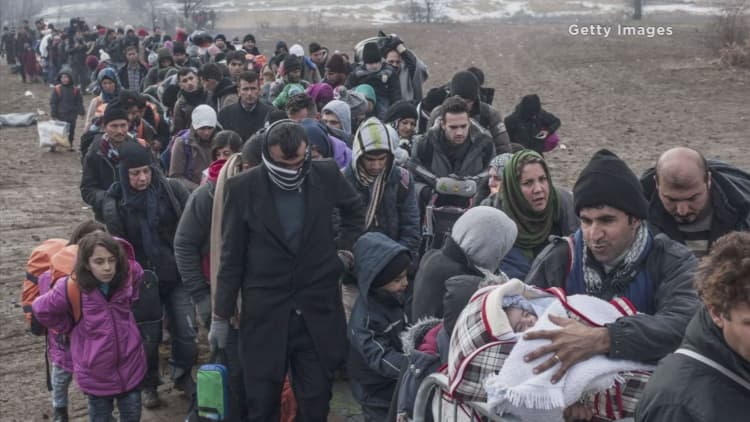
The refugee crisis in Europe and concerns over the economy, jobs and terrorism are very much related to one another in the minds of many Europeans, according to a new report from the Pew Research Center.
In 8 of 10 European nations surveyed by the Washington-based think tank, more than 50 percent of the people surveyed believed that incoming refugees increased "the likelihood of terrorism in their country," Pew said in a report published late on Monday. Many people surveyed were also worried that refugees will be an economic burden, the survey showed.
"Half or more (of people surveyed) in five nations say refugees will take away jobs and social benefits. Hungarians, Poles, Greeks, Italians and French identify this as their greatest concern.
Although fears linking refugees and crime were much less pervasive, nearly half of the people surveyed in Italy and Sweden said refugees were "more to blame for crime than other groups," Pew said.
Pew Research Center conducted its survey by telephone and face-to-face interviews in 10 EU nations and the U.S. among 11,494 respondents from April 4 to May 12, 2016. The survey took place before the "Brexit" referendum in the U.K. and terrorist attacks at the Istanbul Atatürk Airport, both of which took place in late June. The survey included countries that account for 80 percent of the EU-28 population and 82 percent of the EU's gross domestic product, Pew noted.
Negative attitudes
Despite the relative affluence and educational standards of the countries in which the surveys took place, the answers reveal deep-seated concerns and prejudices over "newcomers" to the continent, somewhat damaging the notion that Europe is a beacon of tolerance for different cultures and peoples.
The influx of refugees on the continent, mainly as a result of persecution, conflict and poverty in the Middle East and Africa has certainly put Europe's leaders, resources and administrative capabilities to the test. A million migrants arrived in 2015, according to the United Nations, with many thousands travelling in crowded and unseaworthy boats either across the Mediterranean or over land via Turkey. Many have travelled northwards through Europe aiming to reach more prosperous nations such as Germany but many thousands were prevented from travelling onwards when several key borders between countries were closed.
The crisis has also exposed deep ideological divisions in Europe. In particular, the question of how to fairly distribute and rehouse possible refugees among the 28 nations within the EU has proved divisive with several eastern European countries opposing a quota system to receive people.
For many Europeans, the thorny and longer-term issue of integration – especially of refugees of other religious backgrounds and cultures - is as important as the immediate logistics of safeguarding and rehousing refugees.
Pew's research showed that perceptions of refugees are influenced in part by negative attitudes toward Muslims already living in Europe.
In Hungary, Italy, Poland and Greece, more than 60 percent of people had an unfavorable opinion of the Muslims in their country – an opinion shared by at least one in four people in each nation polled. In every country in the survey, the dominant view was that Muslims want to be distinct from the rest of society rather than adopt the nation's customs and way of life. Six in ten people or more held this view in Greece, Hungary, Spain, Italy and Germany.
Ideological divides
Across the European nations surveyed, the refugee crisis has brought into sharp relief deep ideological divides over views of minorities and diversity, Pew noted. Unsurprisingly, people on the ideological right expressed more concerns about refugees, more negative attitudes toward minorities and less enthusiasm for a diverse society.
Ideology was not the only dividing line in European attitudes, with Pew noting that education and age also matter, with older people and less-educated individuals expressing more negative opinions about refugees and minorities.
Along with worries about these minority groups, the survey found mixed views regarding the overall value of cultural diversity.
When asked whether having an increasing number of people of many different races, ethnic groups and nationalities in their country made their country a better place to live, a worse place or did not make much difference either way, over half of Greeks and Italians and about four in ten Hungarians and Poles said growing diversity makes things worse.
Relatively few Europeans believe increasing diversity has a positive impact on their countries. At 36 percent, Sweden registered the highest percentage that holds this view.


